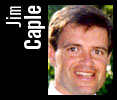 |
| Tuesday, November 20 Bigger not better: Ichiro's skill rewarded By Jim Caple ESPN.com |
|||||||||||||
|
The Most Valuable Player award has Ichiro's name on it, but it's an award the rest of us can appreciate. In an era when MVPs are built like the women's Rumanian weightlifting team, this is an award for all of us who get tired just carrying an armload of groceries across the parking lot. In a time when MVPs endorse creatine and andro, this is an award for those of us who still regard Wheaties as a muscle-building supplement. In a period when MVPs hit so many home runs so far that Microsoft programmers and MIT engineers can't accurately track their distances, this is an award for those who still get thrilled when we can stretch a company softball team hit into a double.
In an age when so much of the game is about power and size and home runs, this is an award that reminds us that baseball still can also be about speed and fielding and fundamentals and hitting balls where they ain't. Ichiro is officially (and liberally) listed as 5-foot-9, 160 pounds, but today he stands taller than Randy Johnson on tiptoes. The first Japanese position player in major league history became the second rookie to win his league's most prestigious award Tuesday when Ichiro edged Oakland's Jason Giambi for the MVP award. "I don't have power and if I can show that I can somehow play major league baseball, I hope (others) feel they can play, too," Ichiro said Tuesday through his translator. "As a player, I think balance is very important to me. If even one element is missing, I can't be a good player. I have to have the balance because my talents are not as extraordinary as other players." While I would have voted for another short guy, 5-foot-10 Bret Boone (who drove in twice as many runs as Ichiro, hit four times as many home runs and scored nearly as many runs), I'm glad Ichiro won the award. If he wasn't necessarily the league's most valuable player, you couldn't slip a batting donut between him and Boone as far as overall performance. And he undoubtedly was the game's most exciting player, leading the majors in All-Star votes, creating such a mania on two continents that a photo of him without clothes supposedly would have been worth more than Barry Bonds' record home-run ball with its identifying infrared mark. The National League MVP, Bonds might have broken the home-run record during one of the finest offensive seasons in history, but his at-bats fell second to Ichiro's in terms of excitement. When Ichiro finished his stretching in the on-deck circle and walked to the batter's box, he brought the entire Northwest and all of Japan to the edge of their seats. Watching him race precisely around the bases was a refreshing change from watching sluggers drop their bat and stroll lazily to first. Ichiro led the majors in hitting with a .350 average and in stolen bases with 56, turning routine groundballs into the most exciting plays in the game. He won a Gold Glove and his arm was so strong and true that he kept a runner from scoring from third base on a single to right. "What doesn't he do?" Seattle reliever Norm Charlton said during the playoffs. "About the only thing he doesn't do is hit 50 home runs, and if he wanted to, he could do that, too. In batting practice, he hits some of the longest balls we've seen. If he wanted to hit .280, drive in 120 runs and hit 40 home runs, you could put him in the No. 3 or 4 hole and he could do that." Not that Ichiro says he will. "If I started hitting home runs, I'd lose who I am as a player." With the batting title, stolen base title, rookie of the year and MVP awards, it all looks so easy now. But it wasn't. While Japanese pitchers had performed very well, no one knew whether a Japanese position player could succeed at the major league level. Remember, Ichiro had to learn a new league, a new language and a new culture. During spring training, his bat often looked slow and many scouts said he couldn't get around on major league fastballs. He proved them wrong. "Playing in major league baseball is a new world for me and whenever you are in a new world, you have worries," Ichiro said. "In terms of the technique of my hitting, I felt I needed to make adjustments in spring training. And (when) I did make those adjustments, all worry and anxiety disappeared. And at the end of spring training, I had confidence." Ichiro is the first MVP since Pete Rose in 1973 to hit fewer than 10 home runs and the smallest MVP since Joe Morgan in 1976. But this season, the little right fielder loomed larger over the American League than Mo Vaughn over a postgame spread. And in doing so, he proved that baseball hasn't completely gone to the muscle-bound, steroid abusers. You don't have to be big to be an MVP. You don't have to be strong enough to lift Tony Gwynn over your head. You don't have to eat your cereal from Jethro-sized mixing bowls. You just have to be good. Jim Caple is a senior writer for ESPN.com. |
| ||||||||||||

